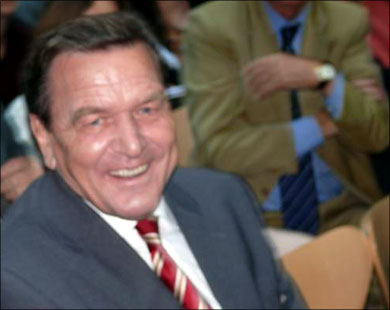After Germany deprived him of part of his privileges as a former chancellor and the European Parliament on Thursday called for sanctions against him, Gerhard Schroeder risks paying a heavy price for his ties to Russian President Vladimir Putin and his holding positions in Russian companies.
Pressure is mounting on the 78-year-old former German chancellor, who still refuses to leave his jobs in several Russian energy groups despite Russia's invasion of Ukraine.
The first reaction came Thursday from the German parliament (Bundestag). The Budget Committee issued a decision proposed by the ruling coalition to deprive the former Social Democratic leader (1998-2005) of some of his advantages, especially benefiting from the offices allocated by the federal government.
The committee announced that "the parliamentary blocs formed for the coalition drew consequences resulting from the behavior of former Chancellor and a member of the pressure group Gerhard Schroeder in light of the Russian invasion of Ukraine."
For his part, German Finance Minister Christian Lindner said on Twitter: "Good.. a former adviser who is publicly pressing for Putin's criminal regime should not get an office with taxpayers' money."
The ruling coalition also explained the decision that "former Chancellor Schroeder no longer has any continuing commitment to his position."
But as a former chancellor, he still has the right to several offices in the Chamber of Deputies and to budget for the salaries of his staff, a privilege that costs taxpayers 400,000 euros a year.
In addition, the former official, who was abandoned by some of his aides in recent months, will retain police protection and his pension.
The Budget Committee called on the government to ensure that from now on "the allowances of former Federal Advisers are made on the basis of their continuing obligations arising from their position and not according to their capacity."
This affects not only Schroeder, but also Angela Merkel, who took office between 2005 and 2021, and may reduce her advantages in the future.
But the main target remains Gerhard Schroeder, who has become a burden even on the current Social Democratic chancellor, Olaf Scholz.
The former chancellor's targeting was not limited to his country Germany, but reached the European Parliament, whose members voted by a wide majority in favor of a non-binding resolution demanding him to resign from his positions in Russian companies.
He refuses to give up his position
But Schroeder remains chairman of the shareholder committee of Nord Stream AG, the controversial gas pipeline between Russia and Germany was suspended in February, and he is the chairman of the supervisory board of the leading Russian group Rosneft.
The resolution states that "European members of the boards of major Russian companies and politicians who continue to receive Russian money" should be added to the EU's sanctions list.
Ukrainian presidential advisor Mikhailo Podolak commented on Twitter, saying that "European sanctions and deprivation of personal privileges are a dishonorable end for the former chancellor," adding that "anyone who presses for the Putin regime in Russia will be scorned by his people."
Schroeder has been under pressure since the invasion of Ukraine began, but unlike most former European leaders who worked on the management bodies of Russian companies before the war, he has not resigned from his position.
Since then, the former chancellor has been stripped of medals awarded by several cities and targeted by calls for his ouster from the Social Democratic Party.
He announced in April that he did not intend to resign unless Moscow halted gas shipments to Germany, a scenario he said he did not believe could happen.
Schroeder, who was an advisor when Putin took office in 2000, established a "true friendship based on trust" with the Russian leader, whom he described in 2004 as an "ideal democrat", political science professor Ursula Munch said in February.
The former lawyer also has financial ties to Russia, and in addition to his current jobs, he is due to join the supervisory board of Russia's giant Gazprom in June.

